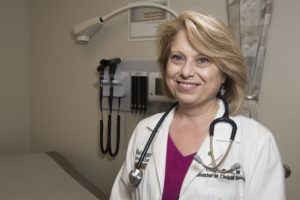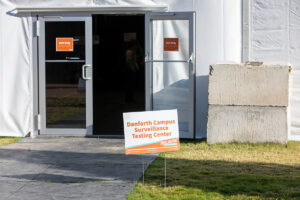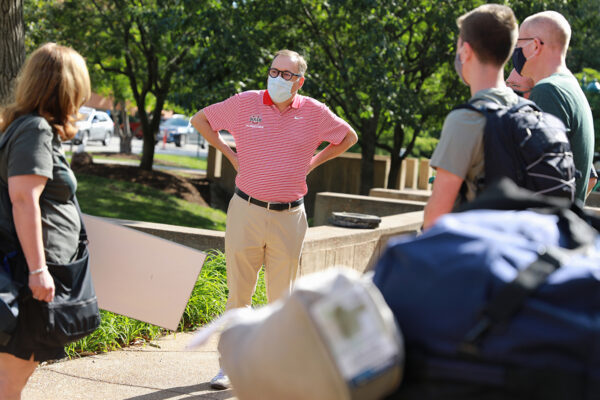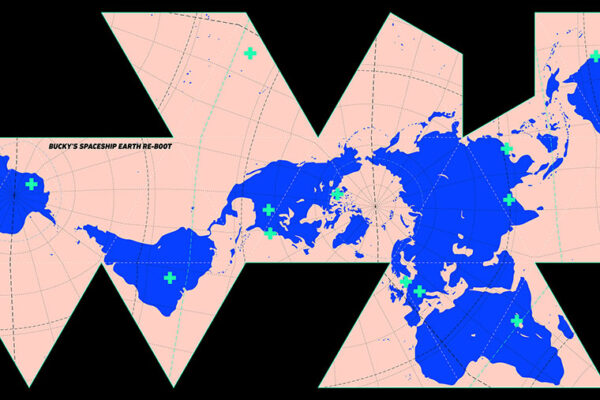
Chuck Finder, executive director of media relations at Washington University in St. Louis, has no formal medical training. But his decades of experiences as a journalist prepared him well for his role as a volunteer COVID-19 case investigator for Habif Health and Wellness Center.
“It can feel like an intrusive process, but it’s so important to get the complete picture,” said Finder, a former reporter and editor for the Pittsburgh Post-Gazette. “It wasn’t enough to ask, ‘So who are your contacts?’ You need to really probe — how close were you, how long were you together. I was part sleuth, but also part uncle because I really wanted them to feel cared for.”
Finder was one of some 25 current and retired staff who joined Habif caregivers and outside staff to serve as case investigators and contact tracers. Their efforts helped keep COVID-19 largely in check at Washington University until Habif Health and Wellness could enlist a permanent team of trained trackers.
“There is no way we would have been able to get through this whole experience without their help,” said Cheri LeBlanc, MD, executive director of the Habif center. “It’s been really heartening to witness their devotion to the well-being of our students and the safety of our community.”
So far, 281 students on the Danforth Campus have tested positive for the virus. Students first learned of their diagnosis from Habif nurses and doctors, who checked on their living arrangements and monitored symptoms. Investigators such as Finder then called students to learn whom they had met and where they had been in the days before the positive test result or the onset of symptoms. Tracers then called those contacts, informing them that they had been exposed and needed to quarantine. By responding rapidly, tracers were able to identify patterns and prevent larger outbreaks.
“Early detection is key,” LeBlanc said. “Our tracers made more than 1,000 calls. Each call gave us a clearer vision of what was happening on campus and what locations or behaviors were or were not leading to cases. For instance, campus classrooms were not connected to cases, but eating out at neighboring restaurants was.”
Case investigator Cristina Walden, MD, would spend 30 minutes to an hour on each call. But not all of that time was spent reviewing contacts and students’ whereabouts.

“For some of our students, this news came as a surprise and was really upsetting,” said Walden, who retired from Habif in May after 13 years treating students. She volunteered to serve as a contact investigator so her former colleagues could focus their efforts on clinical care. “It was important to provide students all of the time they need to have their questions answered and to be reassured.”
All trackers completed the Johns Hopkins University COVID-19 contact tracing course and learned trauma-informed interviewing techniques from Jessica Dyer of WashU Cares and Ryan Lindsay of the Brown School. They were led by Catherine Dalton, who temporarily stepped away from her job as the university’s global travel safety manager to serve as a contact tracing supervisor. Just last spring, Dalton helped repatriate hundreds of students and faculty during COVID-19’s onset.
“Catherine is another example of how people at Washington University pivoted to provide help where and when it was most needed,” LeBlanc said.
At the start of the semester, contact tracers worked a few shifts a week. But after Halloween, cases surged and volunteer tracers were stretched to their limits. Knowing the university needed a sustainable system for winter, LeBlanc has contracted with an outside firm to provide social workers and nurses 13 hours a day, seven days a week.
“It’s time to give our staff and our retirees their lives back,” LeBlanc said. “But it’s good to know that we have such a talented team available should we need them.”
Finder is ready for the call. He was motivated to volunteer after losing his cousin, New York Times journalist Alan Finder, to COVID-19 early in the pandemic. But the work also offered him an opportunity to get to know university students. In his role in Public Affairs, Finder works almost exclusively with faculty to promote their work and research.
“It was, obviously, not a great experience for them, but it was a great experience for me,” said Finder, who also spent nearly four years in University of Pittsburgh Medical Center media relations. “It’s a lot to ask someone who is 18 to 24 years old to stay indoors for two weeks. But our students surprised us all by how well they adhered to the guidelines. They were diligent, they were committed and they really cared for one another.”



Comments and respectful dialogue are encouraged, but content will be moderated. Please, no personal attacks, obscenity or profanity, selling of commercial products, or endorsements of political candidates or positions. We reserve the right to remove any inappropriate comments. We also cannot address individual medical concerns or provide medical advice in this forum.